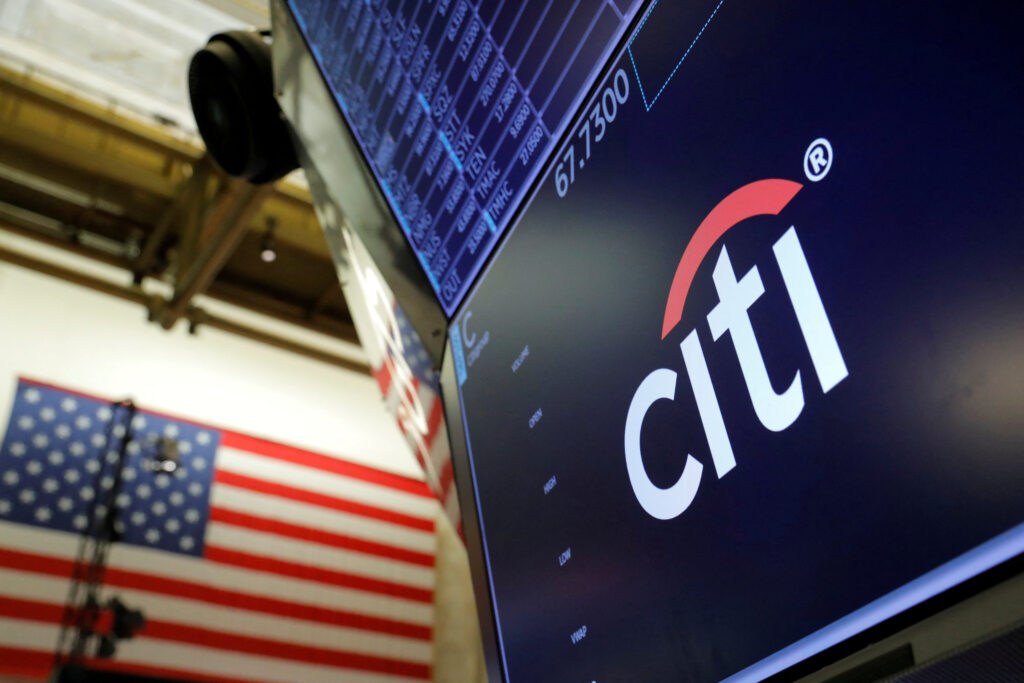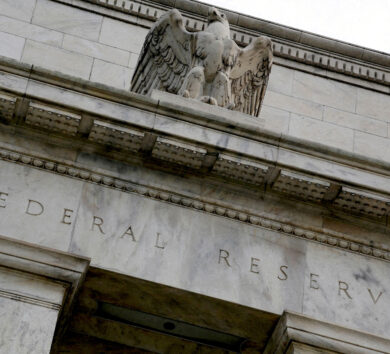

NEW YORK (Reuters)
Citigroup’s profit beat Wall Street estimates on Tuesday, as its traders brought in a windfall from turbulent markets and investment bankers gained from resilient dealmaking in the second quarter.
Stocks and bonds have whipsawed since April, when U.S. President Donald Trump stunned markets by announcing sweeping tariffs against major trading partners. Volatility tends to help Wall Street trading desks as clients adjust their portfolios.
The third-largest U.S. lender’s net income was $4 billion, or $1.96 per share, in the three months ended June 30. Total net income rose 25% from a year earlier.
Analysts, on average, had expected $1.60 per share, according to estimates compiled by LSEG. The bank’s stock rose 1.3% in early trading.
Markets have rebounded, and some deals resumed after the initial shock of U.S. tariff announcements in April subsided. A string of large initial public offerings and multi-billion-dollar buyouts since June have fueled optimism for the second half.
Citi is “at the centre of some of the most significant transactions,” CEO Jane Fraser said in a statement.
Its investment banking fees climbed 13% in the second quarter, while overall banking revenue increased nearly 19% to $1.9 billion.
“We are discussing with clients how the strategic mandates are evolving in light of some of the uncertainty,” Chief Financial Officer Mark Mason told journalists, referring to the August 1 implementation date for some tariffs. “The equity and debt issuance markets remain constructive in light of equity evaluations and the direction of interest rates.”
Citi’s investment banking fees in the quarter were led by mergers and acquisitions, which rose 52% over a year ago, mainly with healthcare and tech deals in North America. Financial sponsors such as private equity firms have also become active, Mason added.
Equity capital markets fees climbed 25% in the quarter, driven by strength in convertibles and IPOs.
The banking division has grown rapidly since its leader, Viswas Raghavan, joined from JPMorgan a year ago.
Markets revenue jumped 16% to $5.9 billion, its best performance since the second quarter of 2020.
Citi jointly led the $1.05-billion IPO of stablecoin issuer Circle and the $650-million listing of retail trading platform eToro. The bank also advised Charter Communications on its $21.9-billion deal to buy privately held Cox Communications in May.
UBS analyst Erika Najarian said in a note to clients that this quarter may mark a more lasting change for the bank. “Citigroup is a well-known capital return potential story, but 2Q results imply that it could be more than this, which could attract more long-term shareholders that had been reticent about owning shares.”
Rival banks beat estimates
Earlier on Tuesday, rivals JPMorgan Chase and Wells Fargo beat Wall Street estimates for second-quarter profit.
Citi’s revenue rose 8% in the quarter from a year earlier to $21.7 billion, notching second-quarter records for its services, wealth, and U.S. personal banking businesses.
Revenue in the wealth unit jumped 20%. Citi executives have said the business is a key growth area. The bank continues to expect a rise in new net investment assets, Mason said.
U.S. personal banking revenues climbed 6% in the second quarter, driven by higher interest-earning balances on credit cards. Most of the credit losses this quarter, of $2.2 billion, were related to the credit card portfolio.
The bank built around $600 million as an allowance for credit losses to address some downgrades in the corporate lending portfolio and some transfer risk of dividends in Russia belonging to clients.
Citi is also working to address regulatory orders to fix longstanding deficiencies in its risk management, controls, and data governance.
As part of those efforts, Citi retired 211 applications in the first half of the year, it said in a presentation. It also enhanced controls in 85 countries to detect “large, anomalous payments.”
The bank was hit by regulatory punishments known as consent orders in 2020 after it erroneously sent $900 million to Revlon lenders.
The compliance issues have weighed on Citi’s stock, which continues to trade at a steep discount to its Wall Street peers, below its book value.
The bank has narrowed the gap by growing its price-to-book ratio over the past year. It has 17 buy recommendations and five hold recommendations from analysts, according to data compiled by LSEG.
Citi shares have risen 24.3% year to date, compared with a 6.6% gain in the S&P 500 through Monday.






Comments